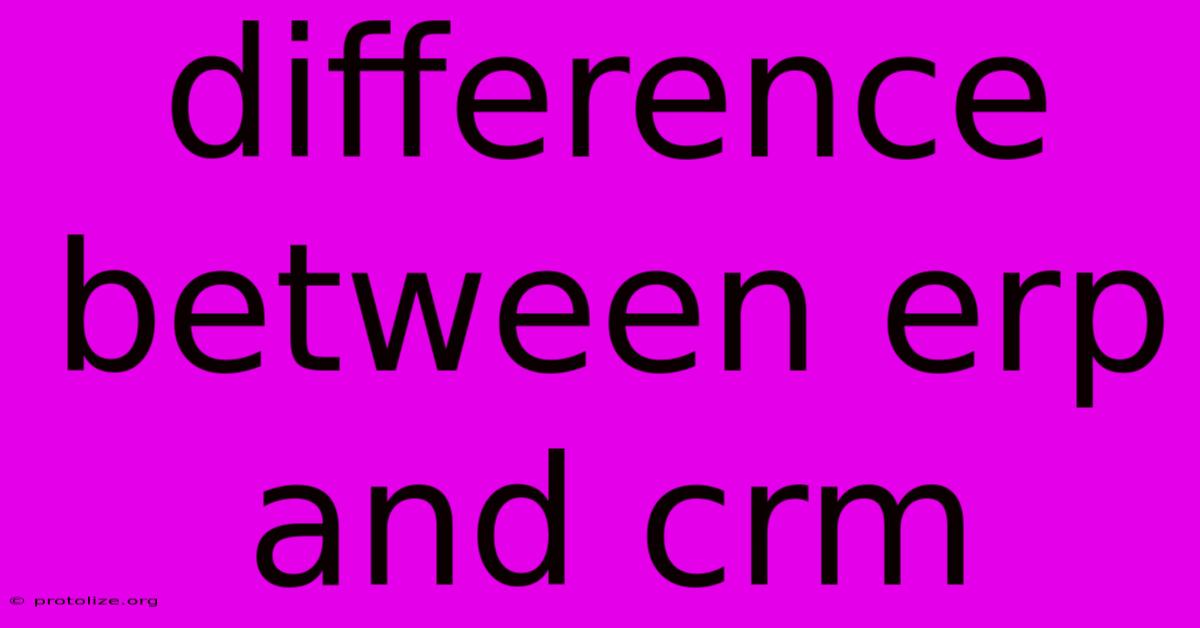Difference Between Erp And Crm

Discover more detailed and exciting information on our website. Click the link below to start your adventure: Visit Best Website mr.cleine.com. Don't miss out!
Table of Contents
ERP vs. CRM: What's the Difference and Which One Do You Need?
Choosing the right software for your business can feel overwhelming. Two systems frequently mentioned are Enterprise Resource Planning (ERP) and Customer Relationship Management (CRM). While they often work together, they are distinct systems with different purposes. This article will clarify the difference between ERP and CRM, helping you understand which – or both – are right for your organization.
Understanding ERP: The Backbone of Your Business Operations
ERP, or Enterprise Resource Planning, is a comprehensive software system designed to integrate all facets of a business. Think of it as the central nervous system, connecting everything from finance and accounting to human resources, supply chain management, and manufacturing. A robust ERP system provides a single source of truth, eliminating data silos and ensuring everyone works with the same information.
Key Features of ERP Systems:
- Financial Management: Handles accounting, budgeting, financial reporting, and forecasting.
- Human Resources: Manages employee data, payroll, benefits, and recruitment.
- Supply Chain Management: Optimizes inventory, procurement, and logistics.
- Manufacturing: Supports production planning, scheduling, and quality control.
- Project Management: Tracks projects, resources, and timelines.
ERP benefits include improved efficiency, reduced operational costs, better decision-making through data-driven insights, and enhanced collaboration across departments. However, implementing an ERP system can be complex and expensive, requiring significant time and resources.
Understanding CRM: Cultivating Customer Relationships
CRM, or Customer Relationship Management, focuses specifically on managing interactions with customers and potential customers. Its goal is to improve customer satisfaction and loyalty, leading to increased sales and revenue. A CRM system centralizes customer data, allowing businesses to personalize interactions, track sales progress, and identify opportunities for growth.
Key Features of CRM Systems:
- Contact Management: Stores customer information, including contact details, communication history, and purchase history.
- Sales Force Automation: Automates sales tasks such as lead generation, tracking, and reporting.
- Marketing Automation: Automates marketing campaigns and analyzes their effectiveness.
- Customer Service: Provides tools for managing customer inquiries and resolving issues.
- Reporting and Analytics: Tracks key metrics related to customer interactions and sales performance.
CRM benefits include improved customer satisfaction, increased sales, enhanced lead management, better marketing campaign targeting, and improved customer retention. While generally easier to implement than ERP, the choice of CRM should align with specific business needs and scale.
ERP vs. CRM: A Head-to-Head Comparison
| Feature | ERP | CRM |
|---|---|---|
| Focus | Internal business processes | Customer interactions |
| Scope | Broad, encompassing all business functions | Narrow, focused on customer relationship |
| Implementation | Complex, time-consuming | Relatively simpler, faster |
| Cost | Typically higher | Typically lower |
| Data Focus | Internal data, operational efficiency | Customer data, sales & marketing performance |
Which System Do You Need?
The answer depends on your specific business needs and goals.
-
Small Businesses: A CRM system might be sufficient initially, focusing on building customer relationships and managing sales. As the business grows, an ERP system could be considered for improved operational efficiency.
-
Large Enterprises: Often require both ERP and CRM systems to manage their complex operations and customer base. Integration between the two systems is crucial for optimal efficiency.
-
Mid-sized Businesses: May benefit from either system, depending on their priorities. A thorough analysis of business processes and requirements is essential.
In conclusion, while both ERP and CRM systems aim to improve business efficiency, they do so in distinct ways. ERP systems focus on internal operations, while CRM systems focus on customer relationships. Understanding these differences is crucial for selecting the right system(s) to support your business growth. Consider consulting with IT professionals to determine the best fit for your specific needs.

Thank you for visiting our website wich cover about Difference Between Erp And Crm. We hope the information provided has been useful to you. Feel free to contact us if you have any questions or need further assistance. See you next time and dont miss to bookmark.
Featured Posts
-
3 Players To Replace Bobby Portis
Dec 09, 2024
-
49ers Vs Bears Live Score Updates
Dec 09, 2024
-
Crm University
Dec 09, 2024
-
Devastated Areas Aussies Return 9 News
Dec 09, 2024
-
Ufc 310 Results Ian Loses To Rakhmonov
Dec 09, 2024
